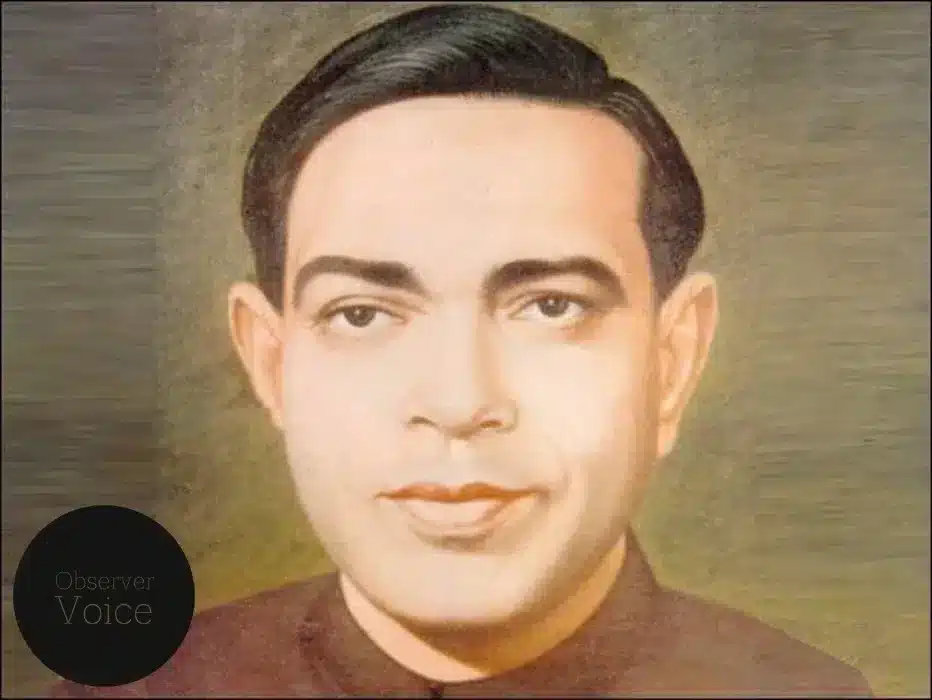Verses of Valor: Exploring the Poetry of Ramdhari Singh Dinkar

Ramdhari Singh Dinkar (23 September 1908 – 24 April 1974), was an Indian Hindi and Maithili language poet, essayist, freedom fighter, patriot, and academic.
Early Life
He was born on 23 September 1908, in Begusarai, Bihar, India. He studied history, philosophy, Hindi, Sanskrit, politics, English, Maithili, Urdu, and Bengali as a student. His favorite authors are Iqbal and Rabindranath Tagore, and he translated Tagore’s writings from Bengali to Hindi.
Dinkar founded the Manoranjan Library in 1920. In 1929, he enrolled in Patna College after graduating from Mokama High School.
Career
In 1928, he published his first big poem, ‘Vijay Sandesh’. The work consists of ten poems about Sardar Vallabhbhai Patel’s peasant satyagraha.
He published a poem on Jatin Das on 14 September 1928. He also wrote Meghnad-Vadh and Birbala, but both have been lost. Soon after, he wrote Pran-Bhang. In 1935, he published his first collection of poems called Renuka.
He wrote a poem called Kurukshetra in 1946, based on the Mahabharata Santi Parva. In the late 1940s, he wrote ‘Dhoop Chhah’, ‘Saamdheni’, ‘Baapu’, and ‘Mitti ki or’.
After that, he wrote his major work, ‘Rashmirathi’, an epic story about Karna, the son of unmarried queen Kunti. It is regarded as the best Hindi version of Mahabharata.
In 1954, he wrote ‘Dilli’, ‘Neem ke Patte’, ‘Neel Kusum’, ‘Samar Shesh Hai’, and ‘Reti ki Phool’. The next year, Dinkar wrote his major composition, ‘Sanskriti ke Char Adhyaya’. Despite the nation being a land of many cultures, the poem emphasizes the spirit of unity in India.
Then in 1957 came ‘Kavishri’, ‘Seepee aur Shankh’, and ‘Naye Subhaashit’ all of which were published in 1957. He wrote ‘Kaavya ki Bhumikaa’ and ‘Venu Van’ the next year.
He wrote ‘Parashuram ki Pratiksha’, ‘Koylaa aur Kavitva’, ‘Mritti Tilak’, and ‘Atmaa ki Ankhe’ in the early 1960s.
‘Saahityamukhi’ and ‘He Ram’ were his analytical compositions at the end of the decade. Later, Metaphors have been written about the lives of great men like Mahatma Gandhi and Swami Vivekananda.
Dinkar’s love for the nation showed in his works in the 1970s. Some of these works include ‘Bharatiya Ekta’. During his last years, he wrote ‘Dinkar ki Daayri’, ‘Vivah ki Musibaten’, and ‘Dinkar ke Geet’.
Among his major works are Krishna Ki Chaetavani, based on the epic Mahabharata, and Urvashi, which won the Jnanpith Award in 1972.
Political Career
Ramdhari Singh Dinkar got into politics during India’s struggle for independence. In the beginning, he supported the revolution but later became a Gandhian. Although he supported violence, he still considered himself a “bad Gandhian.”
He worked for the Bihar government from 1934 to 1947 as a sub-registrar and deputy director of the publicity department.
From 1952 to 1964, he served in the Rajya Sabha after India gained independence in 1947.
He was the Hindi advisor to the Government of India from 1965 to 1971.
In addition to politics, he worked in colleges and universities. From 1950 to 1952, he was head of the Hindi department at Muzaffarpur College. He was vice chancellor at Bhagalpur University between 1964 and 1965.
Awards
In 1959, he won the Sahitya Akademi Award for ‘Sanskriti ke char adhyay’.
In 1959, he received the Padma Bhushan, the third highest civilian award in India. He was awarded the Jnanpith Award in 1972 for Urvashi.
Death
He died on 24 April 1974, in Begusarai, Bihar, India.
Read More: 22 September: Remembering Guru Nanak on his Punya Tithi
Observer Voice is the one stop site for National, International news, Editor’s Choice, Art/culture contents, Quotes and much more. We also cover historical contents. Historical contents includes World History, Indian History, and what happened today. The website also covers Entertainment across the India and World.

